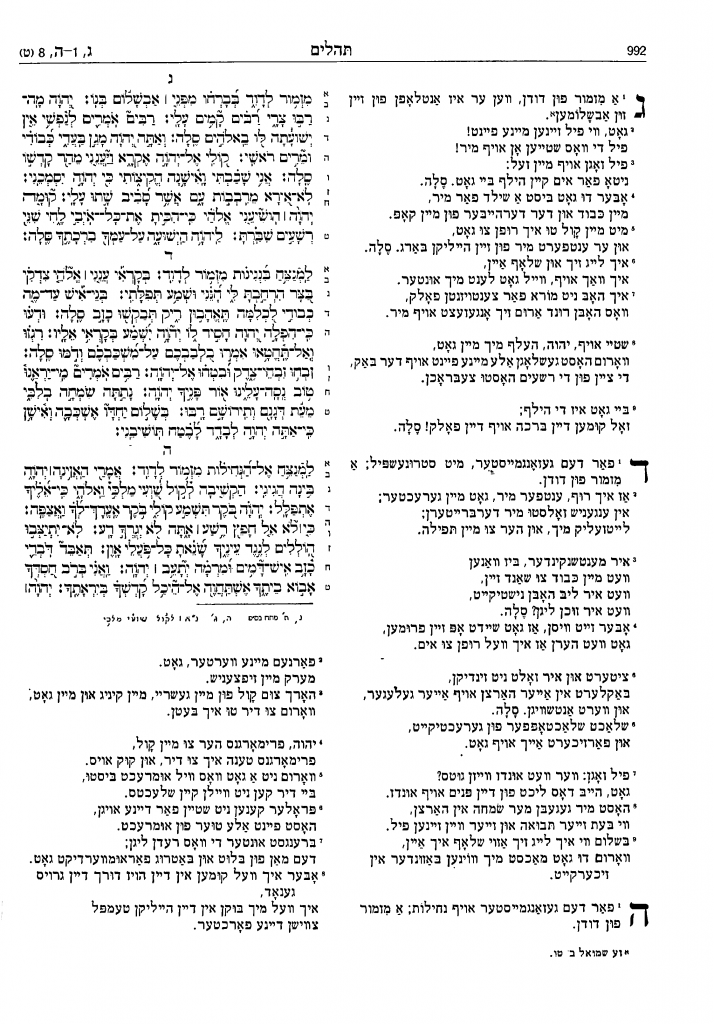Contributor(s): Shared on: Categories: Tags: | Source (Hebrew) | Translation (Yiddish) |
|---|
א לָמָּה רָגְשׁוּ גוֹיִם וּלְאֻמִּים יֶהְגּוּ־רִיק׃ ב יִתְיַצְּבוּ מַלְכֵי־אֶרֶץ וְרוֹזְנִים נוֹסְדוּ־יָחַד עַל־יְהוָה וְעַל־מְשִׁיחוֹ׃ ג נְנַתְּקָה אֶת־מוֹסְרוֹתֵימוֹ וְנַשְׁלִיכָה מִמֶּנּוּ עֲבֹתֵימוֹ׃ ד יוֹשֵׁב בַּשָּׁמַיִם יִשְׂחָק אֲדֹנָי יִלְעַג־לָמוֹ׃ ה אָז יְדַבֵּר אֵלֵימוֹ בְאַפּוֹ וּבַחֲרוֹנוֹ יְבַהֲלֵמוֹ׃ ו וַאֲנִי נָסַכְתִּי מַלְכִּי עַל־צִיּוֹן הַר־קָדְשִׁי׃ ז אֲסַפְּרָה אֶל חֹק יְהוָה אָמַר אֵלַי בְּנִי אַתָּה אֲנִי הַיּוֹם יְלִדְתִּיךָ׃ ח שְׁאַל מִמֶּנִּי וְאֶתְּנָה גוֹיִם נַחֲלָתֶךָ וַאֲחֻזָּתְךָ אַפְסֵי־אָרֶץ׃ ט תְּרֹעֵם בְּשֵׁבֶט בַּרְזֶל כִּכְלִי יוֹצֵר תְּנַפְּצֵם׃ י וְעַתָּה מְלָכִים הַשְׂכִּילוּ הִוָּסְרוּ שֹׁפְטֵי אָרֶץ׃ יא עִבְדוּ אֶת־יְהוָה בְּיִרְאָה וְגִילוּ בִּרְעָדָה׃ יב נַשְּׁקוּ־בַר פֶּן־יֶאֱנַף וְתֹאבְדוּ דֶרֶךְ כִּי־יִבְעַר כִּמְעַט אַפּוֹ אַשְׁרֵי כָּל־חוֹסֵי בוֹ׃
| 1 אַ מזמור פֿון דָוִדן, װען ער איז אַנטלאָפֿן פֿון זײַןזון אַבֿשָלומען.
2 גאָט, װי פֿיל זײַנען מײַנע פֿײַנט!
פֿיל די װאָס שטײען אָן אױף מיר!
3 פֿיל זאָגן אױף מײַן זעל:
ניטאָ פֿאַר אים קײן הילף בײַ גאָט. סֶלָה.
4 אָבער דו גאָט ביסט אַ שילד פֿאַר מיר,
מײַן כּבֿוד און דער דערהײבער פֿון מײַן קאָפּ.
5 מיט מײַן קָול טו איך רופֿן צו גאָט,
און ער ענטפֿערט מיר פֿון זײַן הײליקן באַרג. סֶלָה.
6 איך לײג זיך און שלאָף אײַן,
איך װאַך אױף, װײַל גאָט לענט מיך אונטער.
7 איך האָב ניט מורא פֿאַר צענטױזנטן פֿאָלק,
װאָס האָבן רונד אַרום זיך אָנגעזעצט אױף מיר. 8 שטײ אױף, יהוה, העלף מיך מײַן גאָט,
װאָרום האָסט געשלאָגן אַלע מײַנע פֿײַנט אױף דער באַק,
די צײן פֿון די רשָעים האָסטו צעבראָכן. 9 בײַ גאָט איז די הילף;
זאָל קומען דײַן ברכה אױף דײַן פֿאָלק! סֶלָה.
|
This is a faithful transcription by the Yehoyesh Project of the Yiddish translation of Psalms 3 made by Yehoyesh Shloyme (Yehoash Solomon) Blumgarten (1870-1927) published in Torah, Neviʼim, u-Khetuvim vol. 2 (New York: Yehoʼash Farlag Gezelshaft, 1941). The complete transcription of Torah, Neviʼim, u-Khetuvim by the Yehoyesh Project in copy/pasteable and searchable plaintext may be found here. Verses 2-9 of Psalms 3 are part of the prayers for the Bedtime Shema. Verse 9 is the eighth verse of V’hu raḥum in Pesukei Dezimra and is also found in the Havdalah. Source
 Born in Virbalis, Lithuania (then considered part of Russian-ruled Poland), Yehoyesh (also, Yehoash) was the pen name for Shloyme (Solomon) Blumgarten (also Bloomgarden, 1872-1927), a Yiddish-language poet, scholar and Bible translator. He emigrated to the United States in 1890 and settled in New York. For a decade he was a businessman, but wrote full-time starting in 1900 when he entered a sanitarium for tuberculosis. Yehoash "is generally recognized by those familiar with this literature [Yiddish], as its greatest living poet and one of its most skillful raconteurs", according to a New York Times book review in 1923. His output included verse, translations, poetry, short stories, essays and fables in Yiddish and some articles in English. His poetry was translated into Russian, Dutch, Polish, Finnish, German, Spanish, English and Hebrew. He was responsible for translating many works of world literature into Yiddish, including Longfellow's "Hiawatha" and a very popular translation of the Bible. His version was hailed as a contribution of national significance and perhaps the greatest masterpiece in the Yiddish language. His two volume edition became a standard work for Yiddish speaking homes throughout the world. David ben Yishai was the second king of the United Kingdom of Israel and Judah, reigning ca. 1010–970 BCE. While almost half of the Psalms are headed "l'David" and tradition identifies several with specific events in David’s life (e.g., Psalms № 3, 7, 18, 34, 51, 52, 54, 56, 57, 59, 60, 63 and 142), most scholars consider these headings to be late additions and that no psalm can be attributed to David with certainty. 1 Samuel 16:15-18 describes David as a skillful harp (lyre) player and "the sweet psalmist of Israel." The Yehoyesh Project was an effort to transcribe the entirety of Torah, Neviʼim, u-Khetuvim (New York: Yehoʼash Farlag Gezelshaft, 1941), the Yiddish translation of the TaNaKh by Yehoyesh Shloyme Blumgarten (1870-1927). Leonard Prager z"l (1925-2008), founded the Yehoyesh Project (1998-2006). Robert "Itsik" Goldenberg, Craig Abernethy, Robert Berkovitz, Martin Doering, Matthew Fisher, Jack P. Freer, David Herskovic, Allen Mayberry, Elisheva Schonfeld, Marjorie Schonhaut-Hirshan, and Meyer Wolf all contributed to the success of the project. Read a comment / Leave a comment (moderated) Works of related interest: |












Leave a Reply